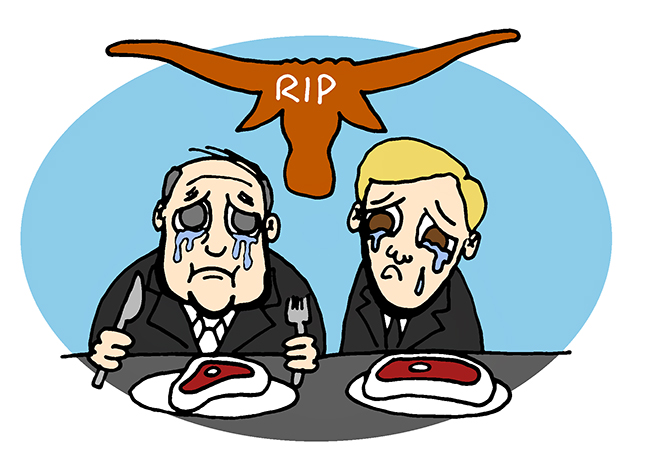Perhaps one of the most iconic and celebrated features of life as a Longhorn fan is the Longhorn mascot, Bevo. He represents the legendary UT football team and the entire culture behind it. Bevo XIV died from bovine leukemia virus last Friday, and much of the UT community has mourned his loss.
Bevo XIV touched the hearts and souls of hundreds of thousands of Longhorn fans, as seen through the level of empathy and kindness that people have expressed towards the animal over social media. But why don’t we extend that level of empathy toward all animals or even all cows?
The difference between a longhorn steer like Bevo and any of the 34 million cattle used for beef or milk production amounts to almost nothing, yet the same people who claim to love the cow do not hesitate when munching down on their hamburger the next day.
People should align their actions with their beliefs — either love Bevo and don’t eat the corpses of his species, or don’t love Bevo and continue eating meat.
Jacek Prus, philosophy senior and president of Students Against Cruelty to Animals, said that this trend of hypocrisy among the community is disconcerting.
“People are sad that Bevo is dead, which is cool, but they don’t make the connection that the burgers and the milk they drink cause suffering to animals like Bevo, except on the scale of hundreds of thousands and millions of them,” Prus said. “Why are we eating our own mascot?”
Prus poses an excellent question. We should be concerned when such a large gap exists between the way we treat different animals of the same species.
“We’re so conveniently isolated from animals that are turned into food, and that’s the only way that this industry exists,” Prus said. “People’s empathy has been destroyed. It can’t exist, because they don’t see the animal and don’t spend time with it.”
Neuroscience freshman Arushii Nadar did not grow up isolated from animals, and her experiences turned her and her mother into vegetarians for life.
“When I was younger, I lived in India. Slaughterhouses were out in the open, and I saw animals being casually butchered,” Nadar said. “It was awful.”
But meat culture is rarely talked about in the United States. 95 percent of Americans eat meat, so doing so is considered normal and acceptable. However, Prus said that the widespread nature of meat eating does not show that it is morally acceptable.
“There are a lot of immoral things that people do around each other,” Prus said.
Although it can seem difficult to empathize with animals people have eaten all their lives, the response to Bevo’s death showed that we do have that capability. It’s about time to try to expand our “circle of compassion,” as Prus calls it, from just our mascot to the millions of other animals who did not have the fortune to be named Bevo.
Govil is a computer science freshman from Austin.





















